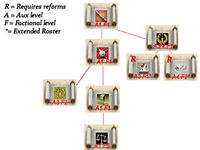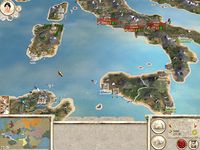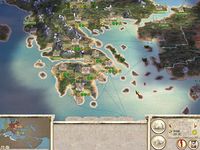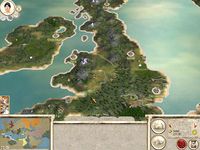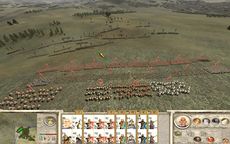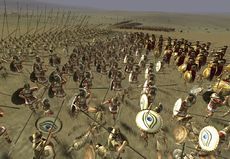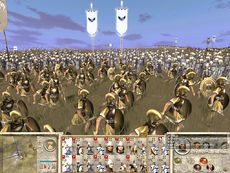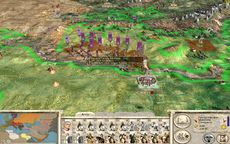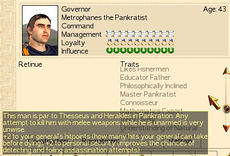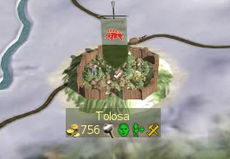Difference between revisions of "Extended Cultures"
(→Eastern Factions) |
(→Hellenic (Greek) Factions) |
||
| Line 65: | Line 65: | ||
*The Ptolemaic Empire | *The Ptolemaic Empire | ||
*Bactria | *Bactria | ||
| − | *Independent Greek Cities (Non-Playable) | + | *Independent Greek Cities (Non-Playable)(removed in XC5) |
| + | *Epirus (added in XC5) | ||
| + | |||
===Eastern Factions=== | ===Eastern Factions=== | ||
*Carthage | *Carthage | ||
Revision as of 23:45, 26 January 2020
| Extended Cultures | |
|---|---|
| Platform | Rome: Total War |
| Mod Type | Overhaul |
| Era | Roman Republic |
| Mod Leader | Ceasar Vincens |
| Release Status | 1.03 |
| Forum / Thread | Here |
Also known as the Extended Greek Mod-Extended Cultures, XGM-XC, or just XC.
Contents
Overview
Extended Cultures (XC) is a modification of Rome: Total War that aims to bring historical accuracy but also show how different factions could have evolved had history taken a different path, with an eye to fun and challenging gameplay. The mod is similar to vanilla (unmodified) RTW in look and feel, but expands the original by bringing new factions, many reworked and new units, and new buildings. In addition to this, a culture system that makes an unique use of Barbarian Invasion features and a large set of new character traits that extensively helps in role-playing will ensure an unique feeling of diversity for many factions.
Features
Designed to work with RTW 1.5, RTW:BI 1.6, or Alexander. It uses a mod folder so it does not make any changes to the data directory. Extended Cultures sports nine culture specific barracks: Roman, Hellenic, Persian, Arabic, Punic, Nomadic, Thracian, Iberian, and Celto-Germanic. The stable and archery range buildings are no longer primary use buildings and missile and cavalry units are recruited from the barracks. In addition to a factional barracks, each faction can build an auxiliary barracks to recruit local troops in many regions. Another pillar of XC gameplay is the culture system. Developed from BI's religions, every region has a native culture, which may be at odds with your culture, and each faction can build colonies to convert that region to their own culture.
The map is a more accurate map than vanilla and is based on the map of the Extended Greek Mod to an extent, as well as Mundus Magnus. In addition, many new units are added as well as a greater variety of religious buildings.
A new feature of this mod is Advanced Order Control, which is a unique government system. Along with the culture system it allows each region to be shaped towards a full factional control, a protectorate-like system or in some cases a mixed administration.
This means that one cannot simply capture a region and leave it at that. The player will have to build up his culture in the captured region, and maybe even migrate settlers from his home land. Hence, building options may vary depending on the level of homeland culture in the city If the opposing faction's culture doesn't vary too much from the player's faction, the governmental infrastructure will not be destroyed and may be retained.
In order to prevent the very large stockpiles of money that are built up by the user faction in the late part of the vanilla game, this mod ties unit upkeep costs to city levels and other things, forcing the player to concentrate on their infrastructure as well as new units in order to support a campaign. Trading is also more important-markets in cities will bring in income but the player must control a trade hub for real money to flow in.
Another feature is the traits and retinues system in this mod, which uses an Ethnic Traits System originally made as a sub-mod for the Extended Greek Mod by Suppanaut. The point of this system is to take the emphasis away from the romans that is present in the vanilla version of the game by incorporating many cultural features and traits for non-roman cultures. From version three of this mod it is only built into Extended Cultures, though previous versions were incorporated into other mods decended from the Extended Greek Mod. This system currently has the following features
- Ethnic traits and their sub-categories-all characters have their ethnic background as well as features attached to them.
- Many new traits and ancillaries-all other factions and cultures are enhanced to have the same depth as the Romans do in the vanilla game.
- Historical figures retinues-there are more than 200 historical figures which may only appear once each game.
- Educations and education abroad-characters can send their sons to one of many famous center of learning in antiquity to earn better education than just hire a tutor to teach at home.
- Family Matters-the player has to handle and headache with characters' family matters, their wives and their children.
- Philosophy school and eastern religion-Ethnic Traits feature important schools of thought and important religions of the hellenistic era.
- Mentor System-ancillaries also help characters to develop skills and personality as well.
- Dynamic trait system-some traits are more fluid and give bonuses based on conditions that the character must fulfill.
- Health and aging system-characters have their own health status and being older means there is more chance to get ill and not working to their full potential.
- Influence of Faction Leader over other members of your Faction-choice of faction leader will effect the fate of factions in the future.
- Command: affects generals' troops’ morale faction-wide (barbarian culture only)
- Management: affects corruption of all governors faction-wide
- Influence: affects all generals' loyalty and bribe cost as well as bribe chance.
- Some traits of faction leader will also give effects faction-wide as well and they have both good and bad traits that affect it. A bad faction leader will ruin the empire, so choose heirs wisely.
- Loyalty and hidden ambition-even with no visible disloyalty, character still have ambition and this unlawful ambition will lead to many bad things.
- Pretender-may be just a mere pretender who fakes his own publicity for a chance to gain power but his ascention will ruin your empire as whole.
- Imperial titles and "Doomed of Empire"-Every faction will claim imperial rights and start a new era of the empire once the empire is glorious enough. However decay of that empire also follows its natural process as well.
- Faction economic policy-Governors of each faction have their own way to develop socially and economically in history.
- Many cognomens and epithet-there are many cognomens and epithets those characters can earn. Some of them are cultural bloc based.
- Doomed of Man-characters with too high attributes or too great in recognition will end up corrupted and their downfall will be caused by their own hybris.
- Strategic exploitation-strategic decisions including logistics, supply, and some strategic movement, its effect could became positive or negative.
Factions
Most of the vanilla factions are preserved, though the Romans have been integrated into a single faction. There are 16 playable factions and four non-playable. New playable factions include Saba and Bactria.
Roman Factions
- Roman Republic/Empire
- Roman Rebels (Non-playable) (This faction becomes the Senate in the Carthaginian Senate campaign.)
Hellenic (Greek) Factions
- Greek Cities
- Macedon
- The Seleucid Empire
- The Ptolemaic Empire
- Bactria
- Independent Greek Cities (Non-Playable)(removed in XC5)
- Epirus (added in XC5)
Eastern Factions
- Carthage
- Pontus
- Armenia
- Parthia
- Saba (removed in XC5)
- Eastern Kingdoms (Non-Playable)
Barbarian Factions
- Thrace
- Gauls
- Germans
- Iberians
- Scythia
- Celts (Non-Playable)
Team
- CaesarVincens is the man behind the mod and team leader. Currently inactive.
- Zarax works as a historian and experiments with new features, balance and skinning.
- Suppanut is XC's master of traits and ancillaries as well as modeler and mapper.
- Maraxus is the primary modeler for Extended Cultures and is also one of the skinners. Currently inactive.
- Anakarsis is the main skinner of Extended Cultures.
Due mention also to DimeBagHo and to all the people who worked on and contributed to XGM, the mod that formed the base of Extended Cultures as well as the EB team and Redfox for lending us units from EB and DTW respectively. Other thanks go to Ferres and Webba for their units and textures.
Included Mods
- Extended Greek Mod (this mod is based on that one and still shares some units)
- ATG Spartans
- Ferres Legions
History
Extended Cultures began as an offshoot of the Post-Marian Project for DimeBagHo's XGM, a project that aims to bring new units to XGM along with further use of the Marian Reforms. One idea that was kicked around was upgrading Barbarian building trees post-reforms to allow new buildings, including huge cities. CaesarVincens made some simple changes and released the first version of what would later be named Extended Barbarians, in homage of Dime's mod's name. Around the same time, Zarax suggested expanding the culture system present in XGM. CaesarVincens liked the idea, and made a mock up of it. Combining Extended Barbarians with this new cultural extension, CaesarVincens released the first edition of Extended Cultures on May 4, 2008. Since then, the mod has grown greatly and on January 9, 2009, the Extended Greek Mod-Extended Cultures was released as a full, self-installing mod. Following the release of Extended Cultures 3, Zarax joined full-time providing support, developing the Carthaginian Senate and emerging factions. While Suppanut expanded his work on ethnic traits to better suit the new faction and culture system. XC4 has recently been released and the mod team is going to continue updating the mod even further.
Current Version
The latest official release of Extended Cultures is XC5 version 1.0.4
